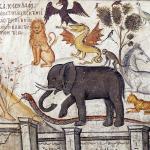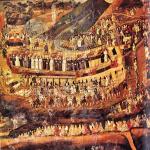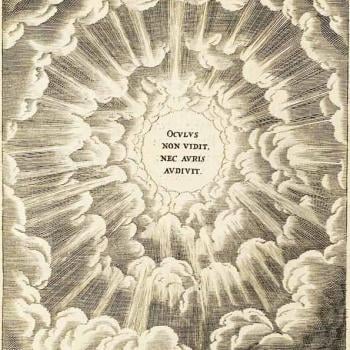CAPUT V.
That the pre-eminent Cause of every object of intelligible perception is none of the objects of intelligible perception.
 ON the other hand, ascending, we say, that It is neither soul, nor mind, nor has imagination, or opinion, or reason, or conception; neither is expressed, nor conceived; neither is number, nor order, nor greatness, nor littleness; nor equality, nor inequality; nor similarity, nor dissimilarity; neither is standing, nor moving; nor at rest; neither has power, nor is power, nor light; neither lives, nor is life; neither is essence nor eternity, nor time; neither is Its touch intelligible, neither is It science, nor truth; nor kingdom, nor wisdom; neither one, nor oneness; neither Deity, nor Goodness; nor is It Spirit according to our understanding; nor Sonship, nor Paternity; nor any other thing of those known to us, or to any other existing being; neither is It any of non-existing nor of existing things, nor do things existing know It, as It is; nor does It know existing things, qua existing; neither is there expression of It, nor name, nor knowledge; neither is It darkness, nor light; nor error, nor truth; neither is there any definition at all of It, nor any abstraction. But when making the predications and abstractions of things after It, we neither predicate, nor abstract from It; since the all-perfect and uniform Cause of all is both above every definition and the pre-eminence of Him, Who is absolutely freed from all, and beyond the whole, is also above every abstraction.
ON the other hand, ascending, we say, that It is neither soul, nor mind, nor has imagination, or opinion, or reason, or conception; neither is expressed, nor conceived; neither is number, nor order, nor greatness, nor littleness; nor equality, nor inequality; nor similarity, nor dissimilarity; neither is standing, nor moving; nor at rest; neither has power, nor is power, nor light; neither lives, nor is life; neither is essence nor eternity, nor time; neither is Its touch intelligible, neither is It science, nor truth; nor kingdom, nor wisdom; neither one, nor oneness; neither Deity, nor Goodness; nor is It Spirit according to our understanding; nor Sonship, nor Paternity; nor any other thing of those known to us, or to any other existing being; neither is It any of non-existing nor of existing things, nor do things existing know It, as It is; nor does It know existing things, qua existing; neither is there expression of It, nor name, nor knowledge; neither is It darkness, nor light; nor error, nor truth; neither is there any definition at all of It, nor any abstraction. But when making the predications and abstractions of things after It, we neither predicate, nor abstract from It; since the all-perfect and uniform Cause of all is both above every definition and the pre-eminence of Him, Who is absolutely freed from all, and beyond the whole, is also above every abstraction.
God is not a body, a physical object or being. But what about being a spiritual being, or an intelligible entity? Dionysius gave a clear answer: God is not a being, a thing in any fashion, whether it is sensible or intelligible (that is, material or spiritual).
Why, then, is God said to be spirit in Scripture? Because Scripture, with skillful means, directs us away from material being, and so by saying God is spirit, Scripture is denying God is a material being, a thing or form which is to be found in and through the senses. It uses spiritual being as an analogy to move us away from any simple materialistic interpretations of the divine nature. In the distinction between matter and spirit, spirit better points to the truth of God than matte. A problem emerges when we confuse the way Scripture employs spirit in relation to God, literalize it, and turn God into a mere intelligible being, a spiritual or metaphysical being or principle which our intellect can comprehend. For then, as we misunderstand the way Scripture uses symbols to point to greater truths about God, we end up limiting God, if not outright making him in our own image. As St. Albert the Great explained, when we apply names and titles to God, we do so through creaturely analogues. Thus, “our use of the names depends on the way in which such things come to our knowledge, so that in this sense the names apply more truly to creatures.”[1] When we over literalize the applications of these names, we think of them in relation to created being, making God understood by the way we understand these qualities, in a creaturely and limited fashion. This ends up making our image and understanding of God creaturely, which is exactly what Dionysius wanted us to avoid. The truth can be evoked by such names and titles, by qualities which we analogously predicate to God, but we must ascend beyond the words, and the limitations implied in them, and follow the spirit in which they were written. To say God is spirit, therefore, is to deny materiality, as spirit is immaterial, but then we must understand that God is not mere spirit, but something which transcends even spiritual being in his essence.
Dionysius, therefore, took on various spiritual or intellectual matters, including universals, which are often attributed to God, and denied them as being proper to God as a way to help us truly ascend outside of all false representations of God. Theologically, these negations are important, because they overcome the contradictions and paradoxes which develop as a result of names and labels we use to represent God, Mystically, or spiritually, these denials allow us to contemplate our inability to comprehend God. Once we truly appreciate the incomprehensible nature of God, and the inability to construct a theological image which proper represents him, we will understand why we must silence our thought. Then we can rise outside of ourselves and into a union with God in which we will know God not in a human fashion, but in a fashion outside of ourselves due to the grace given to us in that union. So long as we hold on to words, those words hinder us, as we become attached to lesser representations of God, turning God into an idol which we can comprehend.
And so, Dionysius wrote, we say, that It [the divine nature] is neither soul, that is the life-force or principle tied to material form, nor mind, that is, an intellect, with all the limitations of a created intellect. For an intellect knows things through experience, according to its principles of reaching out to creation and coming to know what is outside itself. Our intellect knows through the senses as well as through reason and noetic grasping after the principles of being (metaphysical, universal principles).
Without having a mind, nor being mind, Dionysius confirmed that God does not have imagination, or opinion, or reason, or conception, because they are some of the means by which minds seek to understand and know what they do not yet already know. God does not imagine things to be which are not, nor does God have a mere opinion of what is in which he can be mistaken. Because God is not ignorant, God does not deliberate through reason as a means by which he discovers what he does not yet already know. God knows without deliberation, without speculation, without opinion, without vain attempts to imagine and decide for himself what is true or not, for the truth comes from him and is not independent from him. He has no mere conception or ideas about the world: the world comes to be through him, what is, he knows without any possibility of error. By denying imagination, opinion, reason and conception to God, Dionysius was not suggesting God to be ignorant, but the reverse; he showed how we must understand the way God’s knowledge transcends our way of knowing (which is based upon ignorance, supposition, imagination, opinion, and deliberation through reason). God is not limited; God is not ignorant, and so God is not contained or understood by the way we understand a mind and how it operates. God can be, and often is, described as possessing or being a mind, in positive theology, as a way to show God is not ignorant, but then, when we understand the limitations of the mind, we then have to say God is not a mind nor has one, because God knows in his simple act of being without need of a secondary structure like a mind to know. So then, having accepted the notion of a mind in relation to God, we detach ourselves from that notion and transcend it, seeing it is an analogous pointer to a higher truth (that is, it is not a pointer pointing to itself as the truth).
[IMG=At A Loss by George Shuklin [GFDL (http://www.gnu.org/copyleft/fdl.html), CC-BY-SA-3.0 (http://creativecommons.org/licenses/by-sa/3.0/) or CC BY 2.5 (https://creativecommons.org/licenses/by/2.5)], via Wikimedia Commons]
[1] St. Albert the Great, “Commentary on Dionysius’ Mystical Theology” in Albert & Thomas, Selected Writings. Trans. Simon Tugwell, OP (New York: Paulist Press, 1988), 192.
Stay in touch! Like A Little Bit of Nothing on Facebook












